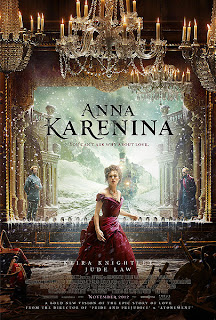DVD/Blu-ray: "Anna Karenina" ravishing and alive if a wee bit chilly
Anna Karenina (2012)
129 min., rated R.
Full disclosure: this writer has not had the pleasure of reading Leo Tolstoy's "great" 1877 literary tome "Anna Karenina," but with Cliffs Notes and so many filmic incarnations of the oft-told story available, why not just jump into the umpteenth and latest adaptation with a clean slate? Directed by Joe Wright (2011's thematically rich, exhilarating "Hanna"), working from a script by Tom Stoppard (one half of the Oscar-winning pair behind "Shakespeare in Love"), this "Anna Karenina" is carried out with a highly stylized, theatrical, and radically audacious approach that ends up paying off. There is initial trepidation with films that frame stories in self-conscious artifice, making it nigh impossible to get wrapped up in the story, but for the most part, this isn't one of those cases.
With the visual opulence of Wright's "Pride & Prejudice" and "Atonement" in concert with the impressively orchestrated (often one-take) choreography of "Russian Ark," the film is staged as if it were a play, literally beginning on a playhouse stage. The proscenium curtains open to a title card, setting the scene in Imperial Russia, 1874, followed by scenery changes, stagehands bringing in set-pieces, actors walking in the wings and up in the rafters, and everything falling into place with fluid movement. Even then, the story isn't always confined to the stage (i.e. ballrooms and opera houses), opening up the scope to a snow-covered countryside and a field of golden wheat. Whether or not this conceit—you could call it a gimmick—serves any underlying subtext or motivation to the story never crystallizes, but it sure looks ravishing and makes for an intriguing technical feat.
If your high school or college professors were cruel, you may know the story. Upon first meeting high-society woman Anna (Keira Knightley), she is pampered, living in St. Petersburg with statesman Alexei Karenin (Jude Law) and their son Serozha (Oskar McNamara) whom Anna adores. Getting off the train in Moscow to tend to the marital problems of her happily philandering brother, Oblonsky (Matthew Macfadyen), she catches the eye of a young, dashing cavalry officer, Count Vronsky (Aaron Taylor-Johnson). Stoppard's screenplay deftly counterbalances the scandalous affair with a parallel love story: Oblonsky's sister-in-law, Kitty (Alicia Vikander), rejects the marriage proposal of landowner Levin (Domhall Gleeson) because she fancies Vronsky. But if you didn't already know, Anna and Vronsky impulsively fall into a torrid, forbidden love affair that threatens her social standing, possession of her son, and leaves her largely excommunicated from society, especially fan-fluttering ladies who stab her with disapproving looks. It's so tragic she could just kill herself.
With the trappings of a fussy, stodgy period drama, "Anna Karenina" is neither of these things from Wright's unconventional staging, the camera constantly roving and the pace pretty breakneck, especially in the first half. We're left to just admire the stylistic choices and the filmmaking process, while the characters are placed at a distance. Vast emotional involvement is the central conundrum here, preventing one from fully feeling the tragedy that befalls Anna by the end of this gloriously melodramatic Russian epic. But it's tricky: are we actually supposed to sympathize with Anna's indiscretion or just take it as her own ruin? After all, she's not conflicted, she's just in love, so Anna has made her own bed and now has to sleep in it, er, jump in front of a train. Perhaps it's just one of the risks of page-to-screen translations, missing the nuances and complex emotions of the source, or it's merely the intent of Tolstoy's novel.
Knightley (Wright's simpatico muse) is in her depth here as the fallen heroine. As written on the page, Anna is so selfish and needy, a character too complicated to fully understand and connect with on an emotional level, and Knightley does that quite well with any forced likability. Less boyish than the casting would seem (the twirly mustache certainly helps), the strapping, handsome Taylor-Johnson is both arrogant and vulnerable as "the murderer of her happiness," also creating an erotic passion with his co-star. Garnering most audience empathy is a balding Law, as the selfless, cuckolded husband, in a devastating, understated performance. His portrayal of Karenin is so selfless that, once figuring out her infidelity, he never strikes her and, when asked to hold hands with Anna's lover over her death bed, he doesn't strike him either. Supporting these three is a reliable who's who cast of British character actors, including Macfadyen as Oblonsky, gliding and twirling into his jackets as if he were in a musical with a Falstaffian humor; Macdonald, as Oblonsky's long-suffering wife Dolly; Olivia Williams, as Vronsky's countess mother; Emily Watson, as a disapproving countess; and Shirley Henderson in one climactic scene.
If Wright's single, five-minute tracking shot on the beach of Dunkirk in "Atonement" inspired awe, the pivotal ball scene, where Anna and Vronsky's dance together creates quite the stir, is dizzying, sweeping cinematic magic. There's also a breathless, masterfully cut horse race in which Karenin's suspicions of his unfaithful wife are confirmed. Even the actors freeze in time a couple of times, making us more aware of the play-like gimmick. Reservations aside, "Anna Karenina" is an entertainingly alive take on the dusty classic, with experimental ambition and filmmaking ingenuity swirling throughout and making the film something to appreciate a great deal.
Grade: B











Comments
Post a Comment